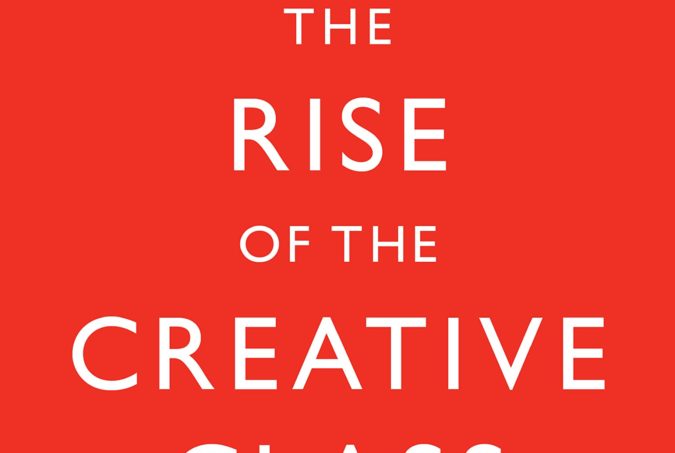
Cover of Revise of the Creative Class (Revisited)
Richard Florida tells an anecdote at the beginning of Rise of the Creative Class (Revisited) about competing in a pinewood derby when he was a child. He’s given the basic materials—a block of wood, some axles, a few little wheels—and the rest is up to him. Poor Richard put essentially no effort into his little car, and he lost badly. His father, who held some kind of supervisory role at a glasses factory, enlisted the skilled machinists working under him to build his son’s car the following year. And the year after that, and the year after that, and so on. Every year that young Richard was eligible for the competition his entry was professionally designed and machined, so he of course won. Florida tells the reader this as a heartwarming tale about the triumph of teamwork and creativity, but really it’s just a story of a kid using his privilege to cheat. He’s just another kid born on third base who thought he hit a triple. The entire book is that same blend of arrogant and oblivious.
I have neither the time nor the desire to take the whole book apart, but a few issues jumped out at me. First, Florida offers no coherent definition of creativity. He builds his entire argument around the idea that there is a large class of people who possess this quality, but does not—probably cannot—tell us what this quality actually is. Second, his definition of the “creative class” is so broad as to be essentially useless, and his metrics as to what is important about it jump around considerably. At some points in the book he argues that traditional education isn’t a reliable indicator as to whether or not one is a member of the “creative class,” but at others he uses education levels as a proxy for membership in this class. Florida offers no internal consistency or concrete definitions. For all his research, it’s all just fuzz. Third, he uses wages as a proxy for productivity, which is absolutely ludicrous. Even when the first edition The Rise of the Creative Class was published it was already well documented that productivity had been outpacing wages for decades. Wages absolutely cannot be used as a proxy for productivity. Finally, his understanding of urban policy is suspect. His brief discussion of the notoriously racist and classist era of “urban renewal” is a display of profound ignorance. Over a million poor people and people of colour were displaced and lost their homes as the result of the policy, all in the service of providing infrastructure to enable white flight and helping already wealthy business owners hide the most visible effects of racial and class inequality from business districts. Florida summarizes it instead as surrendering inner cities to the “underclasses.”
Richard Florida writes about issues of urbanism and public policy from a pop-economics standpoint. But it’s extremely important to note that while the University of Toronto, where he is a professor, is home to excellent, well-respected schools and departments of urbanism, public policy, and economics, he doesn’t teach at any of them. He teaches at the Rotman School of Management, which is a business school. Richard Florida isn’t in the business of building cities, he’s in the business of sales, and the product is Richard Florida.
